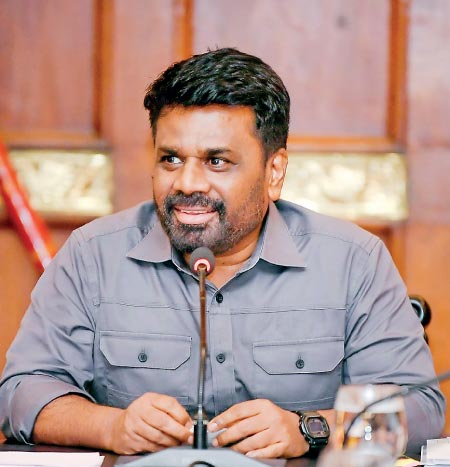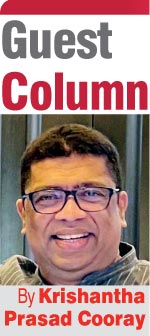Sunday Feb 22, 2026
Sunday Feb 22, 2026
Monday, 16 December 2024 00:01 - - {{hitsCtrl.values.hits}}

President Anura Kumara Dissanayake

Indian Prime Minister Narendra Modi
|
 One side-effect of the polarising effect of nationalism and populism around the world in recent years has been a decrease in the political stability and mandate enjoyed by incumbent regimes. From the erosion of nationalist hegemony in Malaysia or India to the rise of populism in the United States and pockets of Europe, swings in both directions have led to fragile coalitions, divided legislatures and a rise in uncertainty.
One side-effect of the polarising effect of nationalism and populism around the world in recent years has been a decrease in the political stability and mandate enjoyed by incumbent regimes. From the erosion of nationalist hegemony in Malaysia or India to the rise of populism in the United States and pockets of Europe, swings in both directions have led to fragile coalitions, divided legislatures and a rise in uncertainty.
One of the few silver linings to emerge from this cloud of political uncertainty was Sri Lanka’s spritely Anura Kumara Dissanayake, who, at age 55, became the youngest president elected by Sri Lankans in 30 years in a runoff to a closely contested election in October. Dissanayake, colloquially known as AKD, and his National People’s Power (NPP) went before the electorate once more the following month and secured a two-thirds majority in Sri Lanka’s parliament, sweeping the polls and for the first time erasing the ethnic and xenophobic calculations that have plagued Sri Lanka since the island’s independence.
Put populism, nationalism and sectarianism in the rearview mirror
The resounding majorities secured by Dissanayake across Lankans young and old, male and female, Buddhist, Christian or Hindu, and Sinhalese, Tamil or Muslim, are the first ever sign that Sri Lankans are eager to put populism, nationalism and sectarianism in the rearview mirror and unite on the painful journey of rebuilding their proud island nation.
This week, President Dissanayake will be in India for his first State visit, including bilateral talks with another politician who came up from the grassroots and surpassed all political expectations, Indian Prime Minister Narendra Modi. Having just secured his third term through a coalition arrangement, Modi has dealt with four Sri Lankan presidents since taking the reins of India in May 2014.
However, in meeting President Dissanayake this week, Prime Minister Modi will for the first time come face to face with a Sri Lankan head of state who can credibly speak to the concerns and aspirations of every constituency in the country, who leads a Sri Lanka that less than three years after declaring insolvency is fast emerging as the most stable democracy in South Asia.
In sweeping the Parliamentary polls with a two-thirds majority, AKD proved that he has his finger on the pulse of not just a single ethnic group or constituency, but of all Sri Lankans.
Many similar geopolitical challenges
Prime Minister Modi and President Dissanayake face many similar geopolitical challenges today. India remains a political football, with the United States and Russia each vying to bring India closer in a way that very much resembles the tussle Sri Lanka often finds itself in between the competing interests of India and China.
During Modi’s tenure at the helm of India, his government has been careful not to pick sides. He and his right hand for foreign affairs, S. Jaishankar deftly played up India’s value to the United States as an economic and strategic regional counterweight to China, forcing successive US administrations to turn a blind eye to the erosion of liberties in Modi’s India, while tolerating India’s warm relations with Russia.
For its part, Russia, eager to retain a market for their sanctioned oil and military surplus, trades more oil and military technology with India than it would with any other country that retains such close nuclear, military and intelligence ties to the US.
This week, Modi will learn that under AKD’s tenure, Sri Lanka too will seek to strike the right balance of partnerships between India, China and other global powers, in a manner that is ultimately calibrated towards the best long-term interests of Sri Lanka. Dissanayake has the savvy to appreciate the importance of maintaining strong ties with India, but is extremely unlikely to compromise his principles in doing so.
The most recent example of this was how the President handled the controversy around the academic qualifications of AKD’s close political ally, Speaker Asoka Ranwala. When challenged about whether or not he could prove he had earned a doctoral degree, Ranwala first asserted that he would need a few weeks to produce the evidence.
As a longtime senior JVP member with deep connections in Parliament, he had every reason to expect that at minimum, his comrades would help him stall for time and shield him from any attempt to remove him from office.
Intolerance for even the appearance of impropriety
However, just hours after the President made a thinly veiled reference to his party’s intolerance for even the appearance of impropriety, Ranwala voluntarily stepped down, leaving no doubt that his party has zero appetite for distraction as it sets about to fulfil its ambitious mandate.
Ranwala knew as well as any senior member of the NPP does, just how serious President Dissanayake is about his vision for a ‘Clean Sri Lanka’ program, seeking to drive Sri Lankans to aspire to not just environmental, but also social and ethical ‘cleanliness’. This vision was the cornerstone of his electoral campaign. By the time President Dissanayake leaves office, he has made it clear that he wants to leave Sri Lankans with pride in keeping their country tidy, orderly and free of corruption.
As Prime Minister Modi seeks Sri Lanka’s support with India’s priorities, this initiative can serve as a blueprint for collaboration between the countries in a way that could set India apart among Sri Lanka’s other strategic allies. India is uniquely positioned to support Sri Lanka, whether from coming to the table to address the concerns raised in the Sri Lankan courts on India-backed wind energy projects or to support the President in building the infrastructure and incentives required to drive the rest of the program forward.
Unlike anything seen in Sri Lanka’s history
It would be a mistake to presume that Dissanayake’s way of governing is not here to stay. Despite his own left wing populist roots, AKD’s most surprising achievement was building confidence among respected private sector luminaries and entrusting them with some of the most significant levers of power in his Government. The momentum that his leadership team have established to lift Sri Lanka out of the doldrums is unlike anything we have seen in Sri Lanka’s history.
Never has Sri Lanka had a leader who seemed so loved by the masses while also being feared by those who would seek to exploit or manipulate those masses.
There is an opportunity for India to proactively recognise this trend and bring his Government to the table to help Dissanayake drive towards a cleaner Sri Lanka.
If Modi can convince President Dissanayake that his Government will support Sri Lanka’s domestic priorities, that would be the clearest opportunity to build up trust in our ‘big brother’ across the Palk Strait.